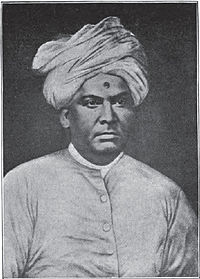Calamur Viravalli Runganada Sastri | |
|---|---|
 Portrait of C. V. Runganada Sastri | |
| Born | 1819/1820 |
| Died | 5 July 1881 |
| Occupation(s) | civil servant, judge |
| Known for | polyglot, scholar |
| Children | C.V. Sundara Sastri P. Anandacharlu (adopted) |
The Right Hon. Calamur Viravalli Runganada Sastri (c.15 February 1819/1820 – 5 July 1881) was an Indian interpreter, jurist, civil servant, polyglot, and social reformer, who was known for his mastery over Indian and foreign languages alike in both classical and vernacular forms, as well as his general erudition and command of jurisprudence. At his death, he is known to have mastered fourteen languages, and had a conversational command of at least two to four more.
In a time where higher positions were foreclosed to Indians, Sastri, in recognition of his brilliance, was nonetheless appointed a Fellow of the University of Madras, rapidly thereafter becoming the first native Indian appointed to the judicature as a judge of the Small Claims Court, and, ultimately, to the Legislative Council of Madras.
He was the first President of the revived Madras Native Association,[1] and. a noted champion of women's rights,[2] advocating female education[3] and the reform of Hindu customary law and practice in child marriage,[4][5] and founding the Hindu Widow Marriage Association with Sir T. Muthuswamy Iyer and Rai Raghunatha Rao in 1872 to promote widow remarriage.[6]
He was progenitor of the Calamur Viravalli family of Iyer Brahmins, a line renowned for brilliance as jurisst and Sanskritists which would go on to dominate the highest echelons of Indian law, as well as political administration and Hindu theology; similarly, he was the guru or teacher to many of the eminent Iyer and Deshastha Brahmin scholars who would go on to preeminence as civil servants and administrators.
- ^ Ramanathan, A. (July 1988). "Mental Hospitals in Madras Presidency". Indian Journal of Psychological Medicine. 11 (2): 149–154. doi:10.1177/0975156419880214. ISSN 0253-7176.
- ^ Jagadeesan, P. (1990). Marriage and Social Legislations in Tamil Nadu. Elatchiappen Publications.
- ^ Oddie, Geoffrey A. (1979). Social Protest in India: British Protestant Missionaries and Social Reforms, 1850-1900. Manohar. ISBN 978-0-8364-0195-0.
- ^ Gungwu, Wang (June 1973). "C. M. Turnbull: The Straits Settlements, 1826–67: Indian presidency to crown colony. (University of London Historical Studies, XXXII.) X, 428 pp., 2 maps. London: University of London, Athlone Press, 1972. £5.50". Bulletin of the School of Oriental and African Studies. 36 (2): 503–504. doi:10.1017/s0041977x00134767. ISSN 0041-977X. S2CID 161707929.
- ^ History of Christianity in India: pt. 2. Tamilnadu in the nineteenth and twentieth centuries. Church History Association of India. 1990.
- ^ Sumathikamalam, Dr S. (8 November 2019). WOMEN EMPOWERMENT THROUGH SELF HELP GROUPS A special Reference with Tiruchirapalli city (1990-2008). Lulu.com. ISBN 978-1-7947-2248-4.